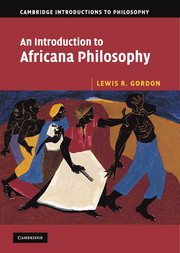Introduction: Africana philosophy in context
Published online by Cambridge University Press: 05 June 2012
Summary
Africana philosophy is a species of Africana thought, which involves theoretical questions raised by critical engagements with ideas in Africana cultures and their hybrid, mixed, or creolized forms worldwide. Since there was no reason for the people of the African continent to have considered themselves African until that identity was imposed upon them through conquest and colonization in the modern era (the sixteenth century onward), this area of thought also refers to the unique set of questions raised by the emergence of “Africans” and their diaspora here designated by the term “Africana.” Such concerns include the convergence of most Africans with the racial term “black” and its many connotations. Africana philosophy refers to the philosophical dimensions of this area of thought.
There is, however, perhaps no greater controversy in philosophy than its definition. As we will see even the claim to its etymological origins in the Greek language is up for debate. This may seem rather odd since the word “philosophy” is a conjunction of the ancient Greek words philia, which means a form of respectful devotion, often defined as “brotherly love,” and sophia, which means “wisdom.” The source of controversy is that it could easily be shown, as scholars such as the Argentinean philosopher, historian, and theologian Enrique Dussel, the Irish political scientist and archaeolinguist Martin Bernal, and the Congolese philosopher, historian, and archaeologist Théophile Obenga have demonstrated, that these words are transformed versions of ancient Phoenician and Hittite words, which in turn are varied and adopted words from the Old Kingdom of ancient Egypt.
Information
- Type
- Chapter
- Information
- An Introduction to Africana Philosophy , pp. 1 - 18Publisher: Cambridge University PressPrint publication year: 2008
